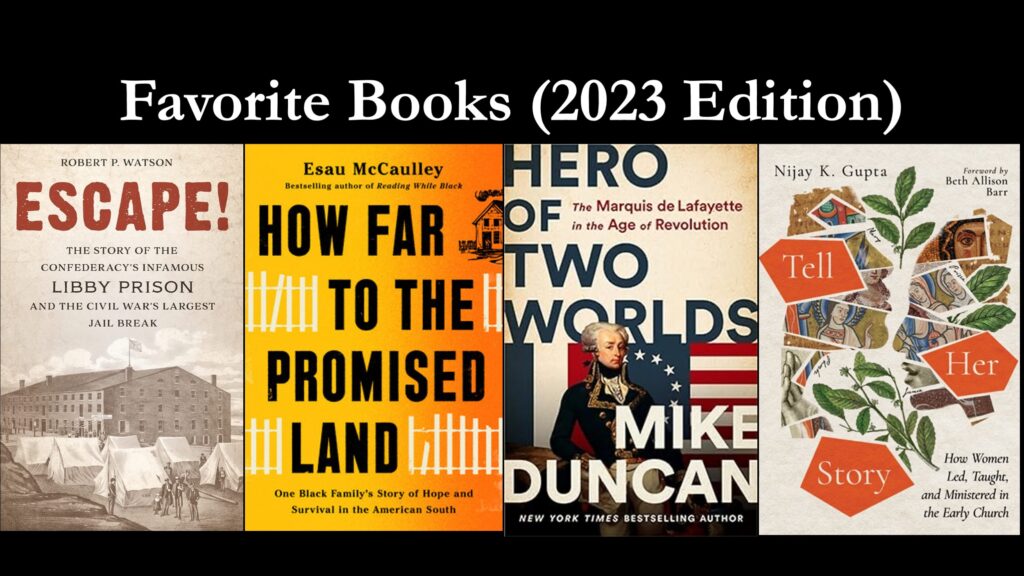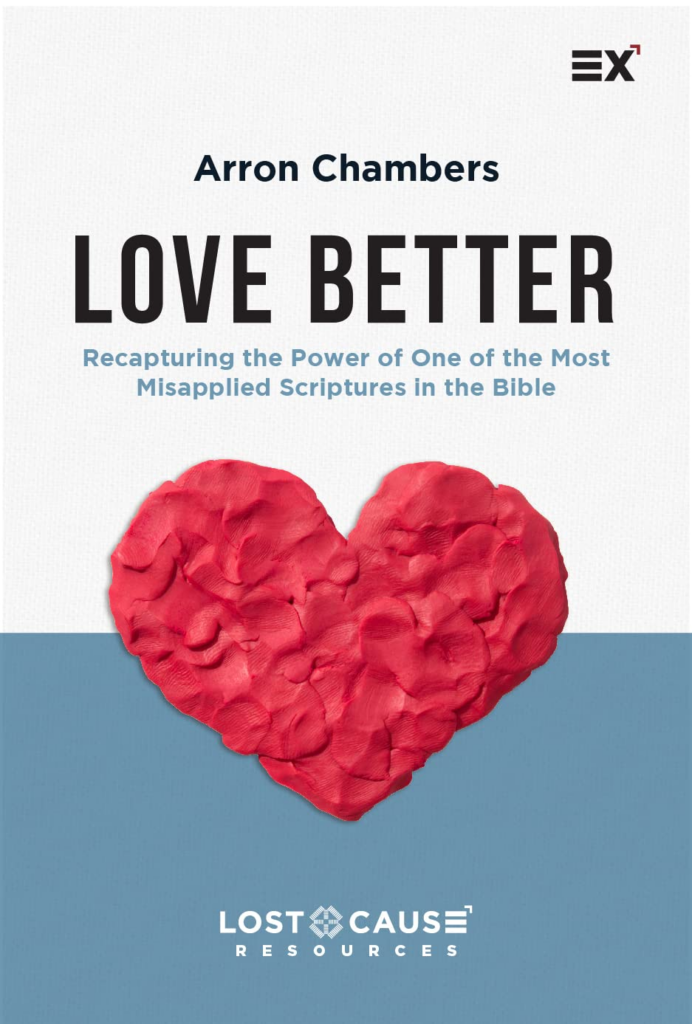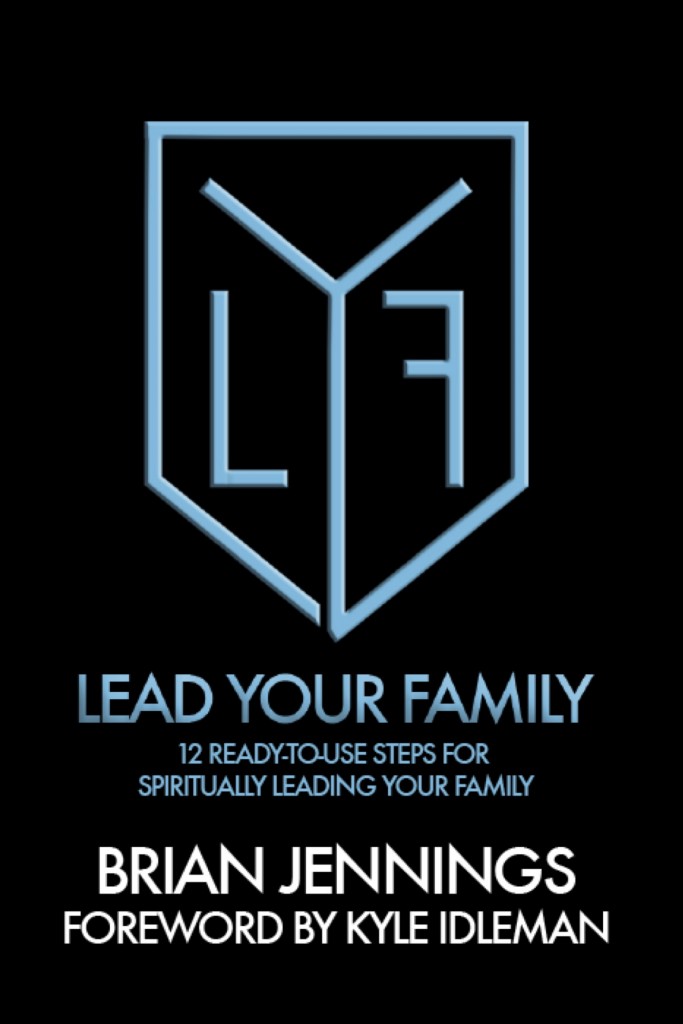Favorite Books & More (2023 Edition)
Written by Brian Jennings, Posted in Blog, Lead Yourself, Your Church, Your Family
My favorite books this year squeezed me through a claustrophobic tunnel below a Confederate prison, filled me with hope at a wedding where a church became family, and instructed me about the Scriptures.
How Far to the Promised Land: One Black Family’s Story of Hope and Survival in the American South (by Esau McCaulley)
There’s a reason why people are showering this book with awards. Wow. Move it to the top of your Christmas list. I’ve read McCaulley’s books and articles for years, so it was a real treat to learn about his life, family, challenges, and hopes. If you like audio books, go that route. McCaulley’s writing is top notch, and his voice makes you feel like you’re just listening to him speak to you while on a road trip.
McCaulley rejects the notion that the challenges he faced can be neatly attributed to only the failings of his father or to only racial injustice. His father did abandon the family, yet his father was also the product of a society that made his life miserable because of the color of his skin. “Evil cannot be wholly explained by the brokenness of this world. Sometimes we participate in the brokenness.”
McCaulley’s white in-laws rejected him, but years later they asked for forgiveness. He wrote, “As long as we draw breath, there’s always a chance to start anew. Forgiveness is the central teaching of our faith.”
The story is raw, vulnerable, honest, and best of all, redemptive without gloss.
Bonus: His little book about Lent guided me through that season in a way I’d never experienced. Superb!
Escape!: The Story of the Confederacy’s Infamous Libby Prison and the Civil War’s Largest Jail Break (by Robert P. Watson)
The Confederacy’s infamous Libby Prison held the most unfortunate of captured Union soldiers. Watson tells the true story of how a group of prisoners battled rats, claustrophobia, freezing temperatures, starvation, scores of slave hunters, and impossible odds to orchestrate the biggest prison break in the history of our country. I could not put this book down.
Watson shares quotes and documents that shine important historical light. What Captain Sam Byers saw in the South shook him to the core. After learning how a slave owner might burn a slave to death for the most minor of offenses or how they mistreated their own soldiers, he wrote, “Slavery has brutalized these men.” We often reflect on the brutality of slavery on the slave. Insightful people during these days also saw the darkness it spread in the souls of the slaveholders.
Tell Her Story: How Women Led, Taught, and Ministered in the Early Church (by Nijay Gupta)
Faithful Bible scholars can disagree about God’s instructions for women in ministry roles. They cannot, however, be faithful to God and be jerks about their position (as some are in the habit of doing) or decline to wrestle with the vast scope and priority of Scripture (as some are in the habit of doing).
Gupta’s book provides the best scholarship I’ve read in defense of an egalitarian position – that men and women are created equally for church leadership. His commitment to the Bible, while appropriately unpacking the historical context, is a gift to those wanting to engage this topic, regardless of whether you reach his final conclusions.
One example: Paul’s words, “I do not permit a woman to have authority over a man,” is trickier than you might think. Do you know how many times the word for “authority” is used in Scripture? Once.
It’s barely used in all of ancient literature. Gupta correctly notes that Paul could have chosen a dozen words to convey a positive role of “leading/teaching/ having authority over.” He did not. Instead he chose a word that, as best we can tell, was only used in a negative way. The verse reads much differently when translated, “I do not permit a woman to dominate over a man with harshness.”
A faithful student must ask, “What is going on in this text?” Gupta’s answer stands up to scrutiny. I encourage you to discover it on your own.
Romans: A Theological and Pastoral Commentary (by Michael J. Gorman)
I faced the daunting task of preaching through Romans this Spring. Considered the most theologically rich book in the New Testament, it packs a mighty punch. I searched high and low for the best resources, and Gorman’s work rose to the top.
Gorman helped me see how reading the thick doctrine at the beginning of the book in light of the community instructions later in the book offers a perception usually missed: Paul is preaching unity in the faith. He puts everyone in their place. My paraphrase: “You are all sinners in need of grace, both the outside world and the inside church folks. So don’t just point your finger at others. You are rotten to the core, and only Jesus can save you.” Paul tries to get everyone to agree on the core tenets of the faith. Why was this so necessary? Because the Jews were expelled from Rome in 49 AD. Once gone, Gentile Christians would have led the young church. About five years later, the Rome allowed the Jews to return. They found a familiar church (one that preached Jesus, cared for the poor, etc.), but a church with a Gentile flavor. Change is hard! Cultural differences can lead to disunity. It was at this very time that Paul wrote this letter. Could the young church of Jews and Gentiles be unified in the faith?
Note: I completed my study prior to NT Wright’s newest commentary on Romans. The other commentaries I found most helpful were by Katherine Grieb and John Stott.
Hero of 2 Worlds by (Mike Duncan)
Name this person:
-Born into extreme wealth and privilege
-Orphaned at the age of 13
-At 18, snuck away on a boat to fight for democracy
-Saved America’s bacon in the Revolutionary War
-Became close friends with Hamilton (and is featured heavily in the musical!!!)
-Opposed Napolean
-Imprisoned for 5 years in Prussia
Marquis de Lafayette lived a complicated life. He sacrificed the comforts of a French aristocrat to give his life for democracy. He believed in the rights of the people, however he failed to carry out his ideals when it came to slavery.
The first half of the book tells of his exploits in America. It’s the better half of the book, partly because the second half of his life did not go so smoothly. The French Revolution was a roller coaster of hope, betrayal, chaos, and murder. His adventures in America filled him with optimism in France, perhaps to a fault.
One thing I won’t forget about this book is that his wife and daughter were given the choice of either not seeing Lafayette at all or moving into his dreary, damp prison with him. They chose the latter. It reminded me of something I’ve noticed: the men of history are usually the movers and shakers politically, but if it’s nobility you seek, read about the women.
Love Better (by Arron Chambers)
Every preacher loves to use I Corinthians 13 in weddings. You can’t go wrong with, “Love is patient, love is kind…” But Chambers teaches us to not restrict these words to weddings. Applied appropriately, they reshape our relationship with other believers and our interaction with the world.
Our church studied I Corinthians 13 this Fall and this book became my #1 resource. “Love Better” makes a great book for groups or families who value Bible study, a book that anyone can read with ease, and extremely practical challenges for how to apply the text to everyday life.
Note: Arron has kindly encouraged me in my writing. He’s a generous friend. If you have a chance, encourage him too. Buy his book (or all of his books) and leave a review. He does great work.
The Cross and the Lynching Tree by (James H. Cone)
James H. Cone was one of the most influential theologians of the past century, and this may be his most notable work. Our perspectives shape our understanding in ways we often ignore. So what would happen to your theology of the cross and suffering if you were haunted by the memory and threat of lynchings. For generations of Christian Americans, this was their lens. Cone invites his readers to discover Biblical truths by hearing the perspective of the oppressed, especially people of color.
Cone’s facts, data, and anecdotes cannot be ignored, and his premise demands serious reflection. I can’t recommend this book enough. Let me leave you with a few quotes from the book:
In the United States, the clearest image of the crucified Christ was the figure of an innocent Black victim, dangling from a lynching tree.
After seeing “Birth of a Nation” [the horrifically racist movie used as KKK propaganda and that declared lynching to be an “honorable act of justice”], one white man in Kentucky left the theater so excited that he shot and killed a fifteen-year-old African American high school student. By 1930, according to one report, 90 percent of white southerners had seen Birth [including President Wilson who praised it as a “religious experience].
The more Black people struggled against white supremacy, the more they found in the cross the spiritual power to resist the violence they so often suffered.
Poverty, By America (by Matthew Desmond)
- The typical payday loan APR in Texas is 664%.
- Since 1985, rent prices have increased 325%.
- The wealth gap between Black and white families is the same as it was in the 60’s.
- Mississippi has the same child poverty rate as Costa Rica.
“Poverty is the feeling your government is against you,” writes Matthew Desmond.
I used to not understand this. Now I do – at least a little bit. This year I learned about a number of heartbreaking issues in our church neighborhood. People, through no fault of their own, often without resource, were being preyed upon. This tossed me into a role I’d never envisioned: advocating for victims of unfair housing practices. If you are surprised to read this, imagine how surprised I was to walk into a meeting with the Housing Director of a big organization! I’m thankful our church leaders have prayed and prepared for HP to be the hands and feet of Jesus in this community, even when our role reminds us of the prophets of old.
Desmond’s new book took a bite out of the ignorance I had. His writing is strongly data-driven with enough storytelling to keep the reader engaged. You’ll find some politics (I agreed with some and not with others), but a chunk of the solutions to poverty involve helpful policies, so they can’t be ignored.
If you read the book, you’ll have a hard time refuting his conclusions: “In America there is not one banking sector. There are two – one for the poor and one for the rest of us – just as there are two housing markets and two labor markets.”
Desmond pleads with the reader to be suspicious of public policy that kindles resentment. That’s a good word. We may whine about the amount of money being spent on public housing. We may oppose “government handouts.” Desmond would kindly ask us if we take the mortgage interest deduction on our taxes. This also is a “government handout,” but this one favors the wealthy. It will cost the government 30 billion this year, and that number is expected to double in two years.
Data like this erodes some of the talking points often aimed to blame the poor. As a country we have lots of work to do. Let it be informed.
Favorite new podcasts
- –Parenting With Ginger Hubbard (critical, applicable parenting help)
- –Here’s Where It Gets Interesting with Sharon McMahon (if you slept through history class, have not read enough, or just want to learn, this is the best)
- –Concurrently (coaching your kids through world events)
Favorite magazine
I subscribe to one print magazine these days. Christianity Today delivers solid issues that encourage, challenge, and grow my faith. They added a special edition this year on the life of Dr. Timothy Keller, which featured people sharing how he’d impacted their lives. I read it twice and put it on my bookshelf.
Next Up
I always have books in the queue. Sometimes the queue fills a bookshelf, which is a problem! Next up for me is Holy Grit by Chad Ragsdale and The Kingdom by Tim Alberta.
What was your favorite book this year?









My favorite book that I read this year was “Brother Wilson” by Lynn Gardner
Why did I wait nearly 28 years after graduating from Ozark to finally read this I don’t know but I’m sure glad I finally did. Lots of great history, encouragement and quotes.
Nice! You and I owe a lot to him.